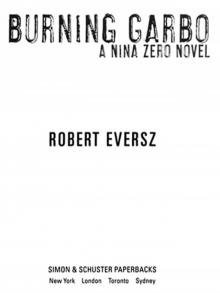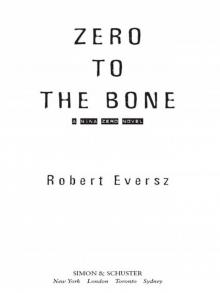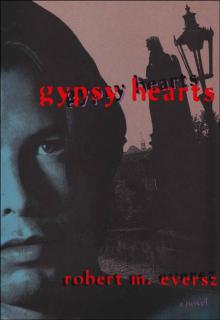- Home
- Robert Eversz
Digging James Dean Page 2
Digging James Dean Read online
Page 2
“You want to be an actress?”
“I guess everybody here says that.”
I gave her the money, glanced over my shoulder at the young man standing at the rail, said, “Don’t let your boyfriend take all of it, okay?”
She pushed the money into the front pocket of her pants. Her pants were tight. She had to push hard. “How did you know he was my boyfriend?”
“Just guessed. What’s your name?”
“Theresa.” She said the name like it was her own.
“Thanks for the tip, Theresa. Just one more question for you.”
She tilted her head to the side, her expression bright and attentive, wanting, it seemed, to get the answer right.
“The guy in the black suit who accompanied Stonewell, you know who he is?”
She shook her head before I finished the sentence. “No, never saw him before,” she said.
“That isn’t what I asked you.”
Her eyes furrowed and she gave her head a little shake. “But you just—”
“I asked if you knew who he was.”
“No, I don’t, no idea,” she lied, stepping back.
I handed her a card with my home and mobile phone numbers, said, “Ask your boyfriend.”
“Look, thanks for the money. If I get another tip, I’ll give you a call.” She turned and took the path toward the pier. A moment later, the boy at the railing decided to walk that way too, still playing the game as though I hadn’t made him the moment I walked up.
While I drove the freeways I counted my losses. I’d be lucky to lose half a grand, including a replacement camera and lens, and that factored in selling the photograph, which I wasn’t sure I’d be able to do. It didn’t matter that Theresa might have lied to me about the guy in the black suit. Frank would know him if he was anybody. Frank knew everybody by sight, name, and reputation. He wrote for Scandal Times. Some of his pieces were first-rate investigative journalism, some pure fiction. He was a good writer. The readers never knew which was which.
The staff at Scandal Times worked out of a former sewage-works warehouse converted to office space in the San Fernando Valley. The paper offered its devout readership the usual tabloid fare—cloned sheep giving birth to live aliens, as Frank liked to call the perfect story—but had made its greatest mark in the tabloid world by reporting on celebrity scandals, where it was the most authoritative source of rumor, if not fact. I freelanced for Scandal Times, giving them first look at everything I shot. They didn’t care that I was an ex-con. In fact, they considered it an asset.
I plugged my parking card into the slot and drove into the employee parking lot next to the building. The lot was about a quarter full and as usual people had double-parked the spaces nearest the door, as though a twenty-yard walk would kill them. I read once that if Americans took the first available space when they parked, rather than circling the rows looking for the closest possible space to the entrance, the gasoline saved every year would power 23,468 rocket trips to the moon. I read that in Scandal Times. I parked toward the back of the lot and gave the Rott a pat on the head, told him to stay. The only animals the paper allowed in the building were the two-legged kind. He whined and let out a single angry bark.
I pulled the point-and-shoot camera from my jacket pocket and pressed the rewind button as I threaded my way between cars. The Rott barked again, and when I turned to let him see I was all right, a man stepped from the cover of the SUV beside me, a ski mask sheathing his face. I whirled to run but another ski-masked figure popped from the opposite side, trapping me in the narrow aisle between the SUV and van beside it. I vaulted toward the roof of the SUV but the one behind me grabbed my leg and something streaked against the side of my head as he pulled me down. Time skipped a groove and I found myself belly-down on the asphalt, a pair of Timberland hiking boots dancing around my head. Hands rifled my pockets and rolled me over. Someone shouted and the shapes vanished, replaced by a black face carrying a wet, red cloth.
The Rott. He was licking me.
A flash sparked, the light flicking hot across my forehead. Frank Adams knelt beside me, a digital camera gripped in one hand while he felt for my pulse with the other. He said, “You don’t mind me taking your photo, do you? This is really too good to pass up. Assaulted right in our own parking lot.”
“It was the dog,” Hector said, arms crossed below the badge that identified him as the Scandal Times security guard. “The second they saw him, they run off.” He pointed through the ring of bystanders toward my car, parked a half-dozen rows back. “Look, you can see the glass on the ground. Went clean through the side window. That dog’s a hero, I tell you.”
“Do you want an ambulance?” Frank asked.
I shook my head and nearly vomited.
“Are you going to live?”
“Hope so,” I said.
“Then get closer to the dog.” He pointed the lens at the Rott. “Hang around his neck or something.”
The Rott licked my face.
The camera flashed.
“That dog may be ugly but he’s a natural around a camera,” Frank said. “We’ll run a sidebar near the back of next week’s issue, headline it ‘aMazing Mutt Mauls Muggers.’ ”
I stretched my hand out to Hector. He pulled me to my feet. I held on to my knees, back braced against the SUV, and tried to breathe some clarity into my head. “They weren’t muggers,” I said.
“ ‘They could have killed me,’ Scandal Times photographer Nina Zero said, tears in her eyes. ‘And maybe they would have, if not for my heroic hound.’ ” Frank moved in for a close-up of the Rott while he improvised. “See, the story just about writes itself.”
“I think I’m going to throw up.”
“Sure, it can use some polish, but it’s not that bad.” Frank watched carefully, ready to photograph me if I fell. “You could cooperate a little, give me something quotable so I don’t have to make everything up.”
I stepped around the SUV and vomited. The crowd of late-night staffers quickly scattered. Someone getting mugged in the employee parking lot was an exciting diversion. Watching the victim throw up wasn’t. I breathed through my nose until the wave of nausea passed, then asked for water. The camera flashed again and I looked up at Frank, pointing the lens at me.
“Don’t get mad,” he said. “You’d take my picture in the same situation. But as your friend and colleague, I counsel you to sit down.”
Somebody handed me a bottle of water, said, “Keep it.”
“I’m not mad at you for taking my picture.” I took a swig, swirled it around my mouth, and spat it out. “I’m mad at you for being such a lousy journalist.”
Frank’s lips made a little O, as though my remark wounded him. He isn’t a handsome man. He’s about forty pounds overweight, cuts his own hair, and wears oversized T-shirts and baseball caps to compensate. Making faces doesn’t help his appearance.
“This story is bigger than a sidebar,” I said.
“You sure you’re okay?”
I took Frank’s advice and sat down again.
“Because sometimes when people get whacked over the head, they can’t think straight for a while.”
“I took Chad Stonewell’s picture this evening outside a restaurant in Santa Monica.”
Frank arched his eyebrows, as if to say, “So?”
“One of his bodyguards stripped the film, broke my Nikon. You know I carry a backup.”
Frank nodded, eyebrows still arched.
“I took his picture with the backup and ran.”
“And you think Stonewell set this up.”
“Sure. Made it look like a mugging.”
“Chad Stonewell would kiss my ass to get his photograph in Scandal Times.”
“I know.”
“Why are you wasting film on him? He’s worth maybe a hundred bucks, tops.”
“I got a tip from somebody needed money.”
Frank stared at me. “Somebody needed money?”
“She
wasn’t more than sixteen.”
“I know, you wanted to help her.” Frank glanced pointedly at the dog. “You’re a sucker for lost creatures, aren’t you?”
The carnival lights of an approaching patrol car skimmed the blacktop. A loud voice told everyone to go back inside, let the boys in blue do their job. I stretched out my arm for a hand up. Frank said, “I think you’re better off sitting down.”
Three
THE INSIDE of my skull felt lined in jagged glass when I woke the next morning, curled on the floor beside Frank’s desk, a Chicago Bulls sweatshirt for a pillow and extra copies of Scandal Times covering me like a hobo’s blanket. I’ve suffered my share of headaches—mostly alcohol induced—but this one disoriented me in a way the others hadn’t. I braced my arms against the floor and pushed myself to standing. Frank had left a glass of water, two Tylenol, and a note on the desk. I swallowed the Tylenol, scanned the note. He’d gone to walk the dog, it read.
I couldn’t immediately figure out why I’d crashed on the floor. I didn’t remember passing out, but then, people who pass out rarely remember it. Two officers from the Los Angeles County Sheriff’s Department had taken my statement the night before. I remembered that much. I’d lost a ninety-nine-dollar point-and-shoot camera and hadn’t been killed—no need to call out the crime scene technicians to vacuum the parking lot. The officers had given me a case number and a phone contact, advised me to seek medical treatment, and motored off to respond to the next call, less than thirty minutes elapsing between the moment they stepped from the patrol car and the flash of their lights pulling out of the lot. I remembered walking up the stairs to Frank’s office after they left. We were going to talk about Stonewell but I couldn’t remember if we did.
I searched out the employee restroom and splashed cool water on my face. Blood veined my eyes so thickly the whites disappeared and the irises had shrunk to black dots. The lump behind my ear had swollen to the size of my chin. My face steamed like a hot rock splashed with water, my heart accelerated, and I wanted to smash something, anything, preferably Stonewell. I breathed deeply, through the pain in my head, through my rage, slowing the anger in my heart, beat by beat. My heart swelled as it slowed and my throat tightened. I gasped, inexplicably near tears. I hadn’t cried in years. I thought the tears had been burned from me years ago, but that morning, as I stood over the sink, they sprang perilously near the surface. Most of the women I knew cried when sad or angry or just frustrated. Tears came to them as naturally as water. Years before, I’d been arrested and convicted of manslaughter. I never regretted committing the crime but since then I’ve been more likely to cry stones than water. Maybe what I’d needed all along to make me a more normal human being was a little tap behind the ear.
Frank and the Rott were waiting for me by the desk when I stepped out of the restroom, the Rott wagging his truncated tail so hard he spun in circles, Frank with half of a glazed donut in his mouth. He pointed at a box on the table, said, “Help yourself. The dog’s already had his share.”
I took a cup of take-out coffee and sat, the Rott quickly finding his spot at my feet. I knew Frank didn’t care much for dogs, said, “Thanks for walking him.”
“No problem.” Frank gulped down the last of the donut and blindly groped for another. “We took a walk in the park. Your dog met another dog, I met the dog’s owner. Your dog got a good sniff of the other dog’s rear end, I got the owner’s phone number. As a matter of fact, your dog and I got along just fine until we started fighting over the donuts.” He kicked out, rolled his chair back to the printer, pulled a sheet of paper from the tray, and scooted forward. “You might want to take a look at this.”
Frank handed me an itinerary of some kind. I tried to read it but the lines on the page fractured like windblown pieces of a jigsaw puzzle. I closed my eyes, breathed deeply, and when I opened them again the word Chicago fluttered to the surface of the page. Frank had booked me a round-trip ticket to Chicago. “What am I doing going to Chicago?”
“We talked about it last night,” Frank said, his mouth full. “You don’t remember?”
I looked at the paper again. “Tonight? Midnight? I can’t possibly make it.”
“You really did take a crack on the head, didn’t you? We’re renting a car in Chicago, driving from there to Fairmount, Indiana. And you’ve already agreed to go.”
I blew ripples across the surface of my coffee, cooling it enough to gulp. A smirk fought to the corner of Frank’s mouth. I asked, “Was I conscious when you asked me?”
“Enough to say yes.”
“I need permission to leave the state. I can’t just pick up and go. Conditions of my parole.”
“I already spoke to your parole officer. It’s in the works.”
I glanced at the donuts, thought something in my stomach might clear my mind. I grabbed one, asked, “What’s the story?”
“Night before last, someone stole James Dean.”
“He’s dead. How can somebody steal him?”
“With a pick and shovel,” Frank said. “Broke into the cemetery after midnight, located his grave, and dug down to the coffin. Then they pried open his coffin and stole his bones.”
“His bones? All of them?”
“Just some. I don’t know which ones yet.”
“Anybody else running the story?”
“Our exclusive so far. I got an anonymous phone call yesterday, some kid asking me if I paid for stories. Sure, I said, but it depends what it is. Dumb little bastard told me everything over the phone. We got an appointment tomorrow morning with the guy who’s heading up the investigation.”
“I don’t get it.” I dropped the half-eaten donut back into the box and rubbed at my eyes to try to clear my vision. “Sure, somebody stealing James Dean’s bones, it’s quirky enough to make a good story but it’s not front-page stuff and I don’t get why it’s big enough to fly us all the way to Indiana.”
“Because Dean’s coffin was broken into by a sect intent on cloning him from the DNA in his bones.”
“Really?”
“Who knows anything for sure anymore?” Frank said. “But it’s going to make one hell of a story.”
My parole officer stepped out of a brown Chevy sedan when I neared the steps of my Venice Beach apartment, just as Frank had promised, the tail of her gray suit coat catching in the gap between her shoulder holster and blouse. She took an unhurried moment to free it and then another to smooth the coat over her shoulders before shutting the door with the clipped heel of her black pumps. She always likes to remind her charges she’s armed, she once told me; it eliminates the question of authority. She didn’t need her authority reinforced, in my opinion. She was a mid-thirties blond who worked out regularly with free weights and trained in judo. If she had a sense of humor, she hadn’t shared it with me. When I evoked her suspicions—which was often, and with good reason—she fixed me with a look of such cool fierceness it was like staring down the barrel of a gun. She didn’t need the one under her shoulder.
“Thanks for coming out,” I said, holding the Rott by his collar. My parole officer was wearing a nice-looking suit, a distinction the dog might fail to grasp in his enthusiasm to greet her.
“I was due for a visit anyway.” She tapped a white envelope against her hip as she walked up. According to the terms of my parole, I needed permission to leave the state. By the look of the State of California seal on the envelope, she’d brought the parolee release form that granted it. She offered her other hand to the dog. He licked it. “He looks good. Fully recovered?”
“He limps a bit when he runs,” I said. The Rott had taken a bullet a week after I’d found him. “But that just makes it easier for me to keep up with him.”
“Your dog looks considerably better than you do.” She didn’t offer the envelope, and though her sunglasses were tinted to a shade that cloaked her eyes, I knew she stared at me by the tracer lines of heat her glance left on my skin. “In fact, you don’t look like you could
keep up with a Chihuahua right now.”
“I was mugged last night,” I said, fingering the bulge behind my ear. “And yes, I filed a police report.”
“Don’t expect me to pat you on the back for obeying the law if, in fact, that’s what you did.” She pointed the corner of the envelope up the stairs. “You can tell me how it happened while I look around your apartment.”
That was another condition of my parole: at any time of her choosing my parole officer had the right to enter my residence, my place of work, or my car and to search it for evidence of parole violations. I walked her up the exterior stairway to the third-floor landing, keyed the door, and swung it open.
“When you moving?” She stepped over the boxes I’d packed several days before, in an unexpected fit of optimism.
“I’m due out next week.”
“Where you going?”
“Don’t know yet.”
Graves slipped her sunglasses into the side pocket of her suit coat, leaned against the kitchenette counter, and stared at me.
“What?” I said.
“Don’t think you can escape by sticking your head in the sand. You knew the consequences when you decided to keep the dog.”
My landlord had given me an eviction notice three months before, when I’d found the Rott. The lease didn’t allow dogs.
I said, “Right.”
“How’s your financial situation?”
“Good enough.”
“Then get off your butt.” She flung open the door to a kitchen cabinet and rearranged the boxes of breakfast cereal. “You need a place to live. You’re on parole. You need a place of residence. If you don’t have a place of residence, your parole is revoked, understand me?”
I said, “Yes, ma’am.”
“Good. Now tell me what happened last night.”
I told the story the same way I’d told it to the police, watching her attack the kitchen cabinets first, then the bookshelves, clothes closet, and bathroom. Every time my parole officer visits, she searches the same places in the same way. Ninety-five percent of the time parole officers are searching for drugs. She knew I didn’t use any. Given my record, however, a gun wasn’t out of the question. She paused once during the search to observe the number of messages beside the blinking light of my answering machine. “Aren’t you curious to hear who called?”

 Burning Garbo
Burning Garbo Digging James Dean
Digging James Dean Zero to the Bone
Zero to the Bone Gypsy Hearts
Gypsy Hearts